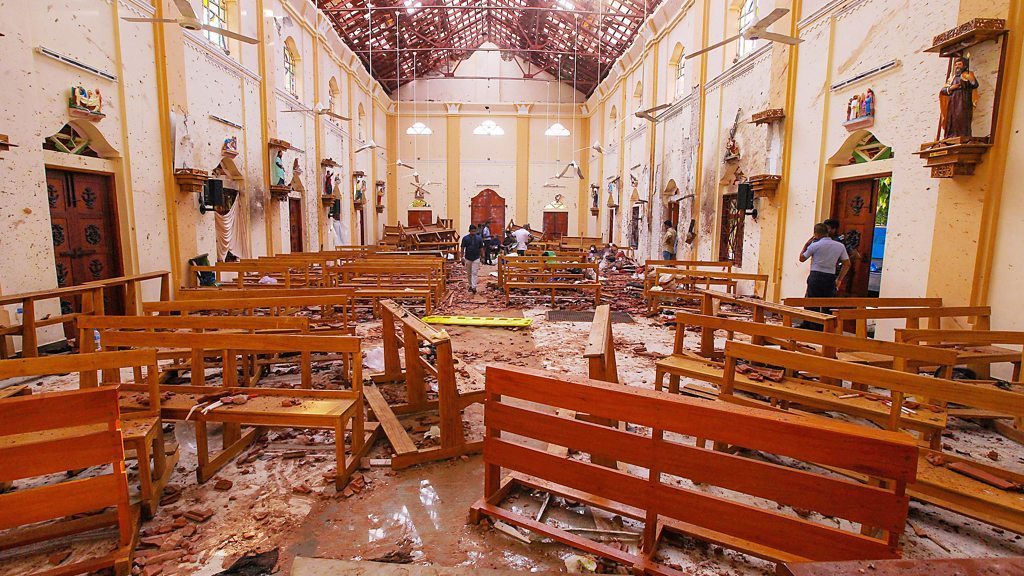A wave of bombings that killed 290 people in Sri Lanka on Sunday was carried out with the support of an international network, officials say.
The government has blamed a little-known local jihadist group, National Thowheed Jamath, although no-one has yet admitted carrying out the attacks.
Another 500 people were injured in the suicide attacks on churches and hotels. A nationwide emergency will be declared from midnight (19:30 GMT) on Monday, the president's office has said.
Police have arrested 24 people in a series of raids.
Meanwhile, another blast rocked a street near a church in the capital, Colombo, on Monday. Azzam Ameen, of BBC Sinhala, said a vehicle used by the attackers exploded as security forces tried to defuse explosives left inside. It is not known if anyone was hurt.
"We do not believe these attacks were carried out by a group of people who were confined to this country," cabinet spokesman Rajitha Senaratne said.
"There was an international network without which these attacks could not have succeeded."
A later statement said President Maithripala Sirisena would ask for foreign help to track down the international links to the attackers.
"The intelligence reports [indicate] that foreign terrorist organisations are behind the local terrorists. Therefore, the president is to seek the assistance of the foreign countries," his office said.
On Sunday, Sri Lankan Prime Minister Ranil Wickremesinghe said security services had been "aware of information" of possible attacks but that the information had not been acted upon.
A curfew is to be imposed from 20:00 (14:30 GMT) until 04:00 on Tuesday, the government said. A national day of mourning has been scheduled for Tuesday.
Sri Lanka's National Security Council said a "conditional state of emergency" from midnight would target "terrorism" and would not limit freedom of expression.
How did the attacks unfold?
The first reports of explosions came at about 08:45 local time with six blasts reported within a small space of time.
Three churches in Negombo, Batticaloa and Colombo's Kochchikade district were targeted during Easter services. Blasts also rocked the Shangri-La, Kingsbury and Cinnamon Grand hotels in the country's capital.
Police have not provided an updated breakdown of how many were killed and wounded at each location.
All the attacks were carried out by suicide bombers, officials said.
Police then carried out raids on two addresses and there were explosions at both. One was in Dehiwala, southern Colombo, and the other was near the Colombo district of Dematagoda in which three officers were killed.
An improvised explosive device - a 6ft-long [1.8m] plastic pipe packed with explosives - was also found and defused near the airport in Colombo.
Police also recovered 87 low-explosive detonators from the Bastian Mawatha private bus station in Pettah, our correspondent reports.
What do we know about the attackers?
There was swirling speculation about who could be behind the attacks and the government restricted access to social media in the aftermath of the bombings.
National Thowheed Jamath was later named by a government spokesman as the main suspect.
The group has no history of large-scale attacks but came to prominence last year when it was blamed for damaging Buddhist statues.
Addressing reports that officials had had prior intelligence of forthcoming attacks, Mr Wickremesinghe said: "We must look into why adequate precautions were not taken. Neither I nor the ministers were kept informed."
A top Sri Lankan official later told the BBC that the government and intelligence services should not be blamed.
Hemasari Fernando - who is also chief-of-staff to President Sirisena, a political rival of Mr Wickremesinghe - said information received earlier this month was of only one or two possible attacks, and that he never expected anything of the magnitude of Sunday's bombings.
Who are the victims?
The vast majority of those killed are thought to be Sri Lankan nationals, including scores of Christians who died at Easter church services.
The ministry of foreign affairs says it believes 35 foreign nationals are among the dead.
They include three of the children of Danish billionaire Anders Holch Povlsen, a family spokesman confirmed to the BBC. Mr Povlsen owns the Bestseller clothing chain and holds a majority stake in clothing giant Asos.
Other international victims include:
At least five British citizens - including two with joint US citizenship
One Portuguese citizen and six Indian nationals
Two engineers from Turkey, according to Turkish news agency Anadolu
Two Chinese nationals, according to the China Daily
Two Australians, Prime Minister Scott Morrison said
One person from the Netherlands
One person from Japan, according to Japanese media citing government sources
What is Sri Lanka's recent history?
Sunday's attacks were the deadliest in Sri Lanka since the end of the country's civil war in 2009.
The war ended with the defeat of the Tamil Tigers, who had fought for 26 years for an independent homeland for the minority ethnic Tamils.
Between 70,000 and 80,000 people are believed to have died in the conflict.
The nation has seen some sporadic violence since. In March 2018 a state of emergency was declared after members of the majority Buddhist Sinhala community attacked mosques and Muslim-owned properties.
Religion in Sri Lanka
Theravada Buddhism is Sri Lanka's biggest religious group, making up about 70.2% of the population, according to the most recent census.
It is the religion of Sri Lanka's Sinhalese majority and is given primary place in the country's laws.
Hindus and Muslims make up 12.6% and 9.7% of the population respectively.
Sri Lanka is also home to about 1.5 million Christians, according to the 2012 census, the vast majority of them Roman Catholic.
Source: BBC





